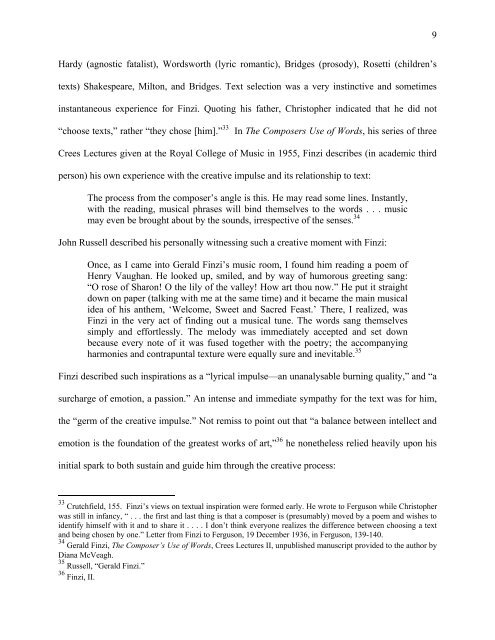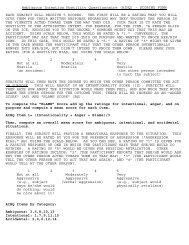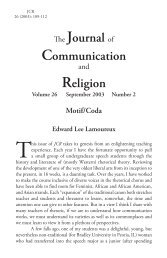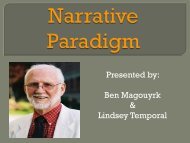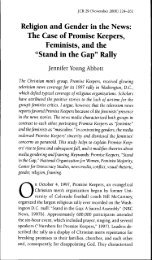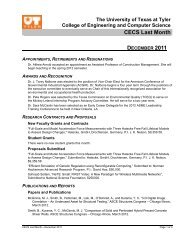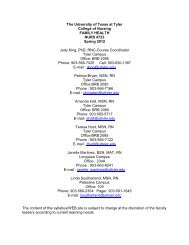"History, Analysis and Performance Considerations of Gerald Finzi's ...
"History, Analysis and Performance Considerations of Gerald Finzi's ...
"History, Analysis and Performance Considerations of Gerald Finzi's ...
You also want an ePaper? Increase the reach of your titles
YUMPU automatically turns print PDFs into web optimized ePapers that Google loves.
9Hardy (agnostic fatalist), Wordsworth (lyric romantic), Bridges (prosody), Rosetti (children’stexts) Shakespeare, Milton, <strong>and</strong> Bridges. Text selection was a very instinctive <strong>and</strong> sometimesinstantaneous experience for Finzi. Quoting his father, Christopher indicated that he did not“choose texts,” rather “they chose [him].” 33In The Composers Use <strong>of</strong> Words, his series <strong>of</strong> threeCrees Lectures given at the Royal College <strong>of</strong> Music in 1955, Finzi describes (in academic thirdperson) his own experience with the creative impulse <strong>and</strong> its relationship to text:The process from the composer’s angle is this. He may read some lines. Instantly,with the reading, musical phrases will bind themselves to the words . . . musicmay even be brought about by the sounds, irrespective <strong>of</strong> the senses. 34John Russell described his personally witnessing such a creative moment with Finzi:Once, as I came into <strong>Gerald</strong> Finzi’s music room, I found him reading a poem <strong>of</strong>Henry Vaughan. He looked up, smiled, <strong>and</strong> by way <strong>of</strong> humorous greeting sang:“O rose <strong>of</strong> Sharon! O the lily <strong>of</strong> the valley! How art thou now.” He put it straightdown on paper (talking with me at the same time) <strong>and</strong> it became the main musicalidea <strong>of</strong> his anthem, ‘Welcome, Sweet <strong>and</strong> Sacred Feast.’ There, I realized, wasFinzi in the very act <strong>of</strong> finding out a musical tune. The words sang themselvessimply <strong>and</strong> effortlessly. The melody was immediately accepted <strong>and</strong> set downbecause every note <strong>of</strong> it was fused together with the poetry; the accompanyingharmonies <strong>and</strong> contrapuntal texture were equally sure <strong>and</strong> inevitable. 35Finzi described such inspirations as a “lyrical impulse—an unanalysable burning quality,” <strong>and</strong> “asurcharge <strong>of</strong> emotion, a passion.” An intense <strong>and</strong> immediate sympathy for the text was for him,the “germ <strong>of</strong> the creative impulse.” Not remiss to point out that “a balance between intellect <strong>and</strong>emotion is the foundation <strong>of</strong> the greatest works <strong>of</strong> art,” 36 he nonetheless relied heavily upon hisinitial spark to both sustain <strong>and</strong> guide him through the creative process:33 Crutchfield, 155. Finzi’s views on textual inspiration were formed early. He wrote to Ferguson while Christopherwas still in infancy, “ . . . the first <strong>and</strong> last thing is that a composer is (presumably) moved by a poem <strong>and</strong> wishes toidentify himself with it <strong>and</strong> to share it . . . . I don’t think everyone realizes the difference between choosing a text<strong>and</strong> being chosen by one.” Letter from Finzi to Ferguson, 19 December 1936, in Ferguson, 139-140.34 <strong>Gerald</strong> Finzi, The Composer’s Use <strong>of</strong> Words, Crees Lectures II, unpublished manuscript provided to the author byDiana McVeagh.35 Russell, “<strong>Gerald</strong> Finzi.”36 Finzi, II.


